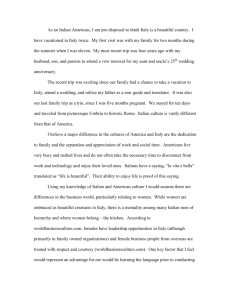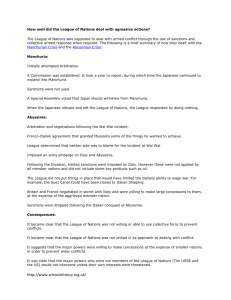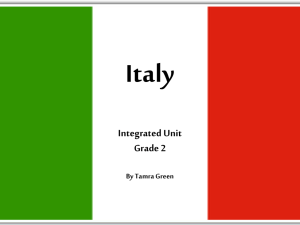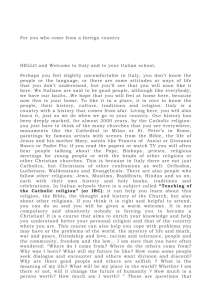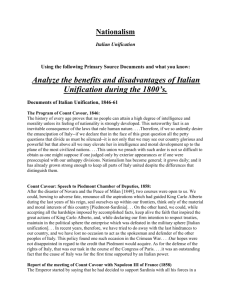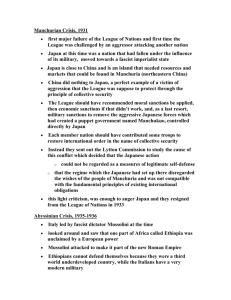(c) crown copyright Catalogue Reference:CAB/24/257 Image Reference:0003
advertisement
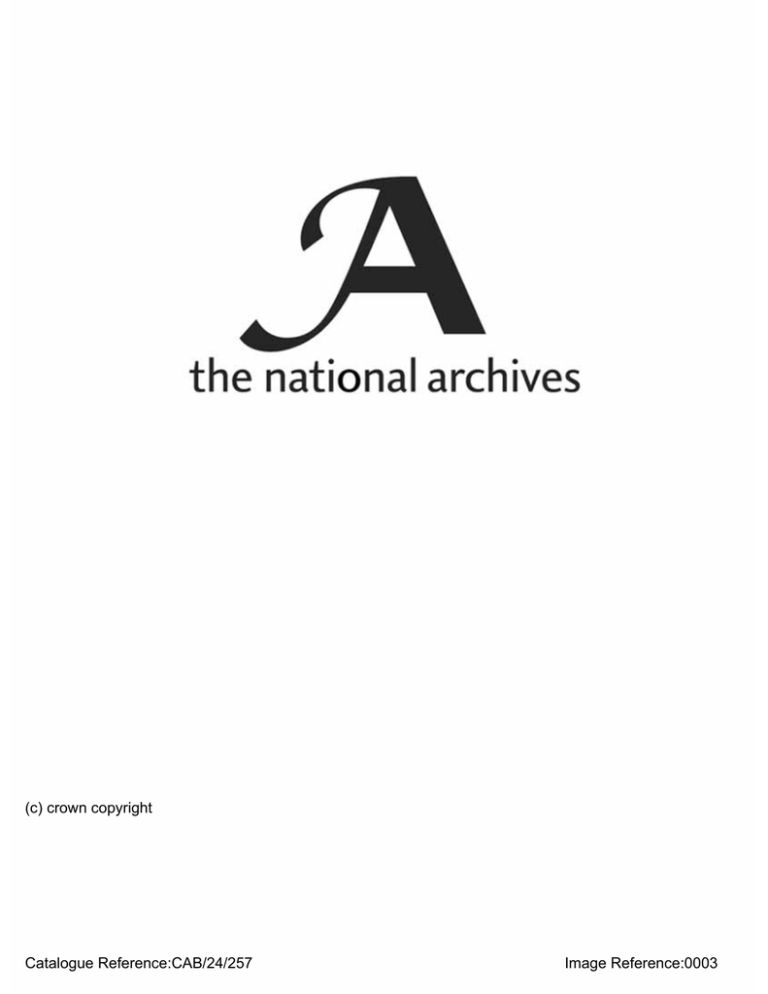
(c) crown copyright Catalogue Reference:CAB/24/257 Image Reference:0003 D O C U M E N T I S T H E P R O P E R T Y OF H I S B R I T A N N I C M A J E S T Y ' S Printed GOVERNMENT October 1935. for the Cabinet. Copy No. CONFIDENTIAL. C P . 200 (35). CABINET. DISPUTE BETWEEN ITALY AND ABYSSINIA. I C I R C U L A T E to my colleagues herewith the annexed resolutions adopted by the Co-ordinating Committee at Geneva. The resolutions have already been circulated among the Foreign Office telegrams, but have been printed in this form for convenience of reference. S. EL October 22, 1935. PROPOSAL No. I. EXPORT OF A R M S , M U N I T I O N S AND IMPLEMENTS OF WAR. Geneva, October 11, 1935. W I T H a view to facilitating for the Governments of the Members of the League of Nations the execution of their obligations under Article 16 of the Covenant, the following measures should be taken forthwith : — 1. The Governments of the Members of the League of Nations which are enforcing at the moment measures to prohibit or restrict the exportation, re-exportation or transit of arms, munitions and implements of war to Ethiopia will annul these measures immediately. 2. The Governments of the Members of the League of Nations will prohibit immediately the exportation, re-exportation or transit to Italy or Italian possessions of arms, munitions and implements of war enumerated in the attached list. 3. The Governments, of the Members of the League of Nations will take such steps as may be necessary to secure that arms, munitions and implements of war enumerated in the attached list, exported to countries other than Italy,, will not be re-exported directly or indirectly to Italy or to Italian possessions. 4. The measures provided for in paragraphs 2 and 3 are to apply to contracts in process of execution. * "tf -K' Each Government is requested to inform the Committee through the Secretary-General of the League within the shortest possible time of the measures which it has taken in conformity with the above provisions. JV. M. "7Y* 8164 [12256] 4/, M. -7T Ji. B ANNEX Articles AS R E V I S E D ON OCTOBER 16, 1935.^ considered as Arms, Ammunitions and Implements A mended List. of War—' Category I. 1. Rifles and carbines and their barrels. 2. Machine guns, automatic rifles and machine pistols of all calibres and their barrels. 3. Guns, howitzers and mortars of all calibres, their mountings, barrels and recoil mechanisms. 4. Ammunition for the arms enumerated under 1 and 2 above; filled and unfilled projectiles for the arms enumerated under 3 above, and prepared propellant charges for these arms. 5. Grenades, bombs, torpedoes and mines, filled or unfilled, and apparatus for their use or discharge. 6. Tanks, armoured vehicles and' armoured trains. Armour plate of all kinds. Category II. Vessels of war of all kinds, including aircraft carriers and submarines. III (combines Categories I I I and V of text in document Comite de Coordination 2 ) . 1. Aircraft, assembled or dismantled, both heavier and lighter than air, and their propellers or air screws, fuselages, aerial gun mounts and frames, hulls, tail units and under-carriage units. 2. Aircraft engines. Category Category IV. Revolvers and automatic pistols of a weight in excess of 1 pound 6 ounces ( 6 3 0 grammes) and ammunition therefor. Category V. 1. Flame throwers and all other projectors used for chemical or incendiary warfare.* 2. Mustard gas, Lewisite, Ethyldichlorarsine, Methyldichlorarsine, and all other products destined for chemical or incendiary warfare.* 3. Powder for war purposes, and explosives. RESOLUTION REGARDING ARTICLE 16, PARAGRAPH 3. Geneva, October 14, 1935. W i t h a view to facilitating for the Governments of the Members of the League of Nations the execution of their obligations under Article 1 6 of the Covenant, it is recognised that any proposals for action under Article 1 6 are made on the basis of the following provisions of that Article : — The Members of the League agree, further, that they will mutually support one another in the financial and economic measures which are taken under this Article, in order to minimise the loss and inconvenience resulting from the above measures, and that they will mutually support one another in resisting any special measures aimed at one of their number by the covenant­ breaking State. * It should be observed that the utilisation of these articles has been, and still is, prohibited under the Convention of the 17th June, 1925. These articles are only mentioned ,above because their manufacture being free (the more so, as in many instances they serve various'purposes), the Committee desires to emphasise that the export of such products could in no circumstances be tolerated. PROPOSAL No. II. FINANCIAL MEASURES. Geneva, October 14, 1935. W i t h a view to facilitating for the Governments of the Members of the League of Nations the execution of their obligations under Article 16 of the Covenant, the following measures should be taken forthwith : — The Governments of the Members of the League of Nations will forthwith take all measures necessary to render impossible the following operations : — 1. A l l loans to or for the Italian Government and all subscriptions to loans issued in Italy or elsewhere by or for the Italian Government; 2. A l l banking or other credits to or for the Italian Government and any further execution by advance, overdraft or otherwise of existing contracts to lend directly or indirectly to the Italian Government; 3. A l l loans to or for any public authority, person or corporation in Italian territory and all subscriptions to such loans issued in Italy or elsewhere; 4. A l l banking or other credits to or for any public authority, person or corporation in Italian territory and any further execution by advance, overdraft or otherwise of existing contracts to lend directly or indirectly to such authority, person or corporation; . 5. A l l issues of shares or other capital flotations for any public authority, person or corporation in Italian territory and all subscriptions to such issues of shares or capital flotations in Italy or elsewhere; 6. The Governments will take all measures necessary to render impossible the transactions mentioned in paragraphs 1-5 whether effected directly or through intermediaries of whatsoever nationality. "A" "JT" "VV TV "ft- The Governments are invited to put in operation at once such of the measures recommended as can be enforced without fresh legislation, and to take all practicable steps to secure that the measures recommended are completely put into operation by the 31st October, 1935. Any Governments which find it impossible to secure the requisite legislation by that date are requested to inform the Committee, through the Secretary-General, of the date by which they expect to be able to do so. Each Government is requested to inform the Committee, through the Secretary-General of the League, within the shortest possible time of the measures which it has taken in conformity with the above provisions. RESOLUTION. Geneva, October 16, 1935. The Committee of Co-ordination, Considering that it is important to ensure rapid and effective application of the measures which have been and may subsequently be proposed by the Committee, Considering that it rests with each country to apply these measures in accordance with its public law, and in particular the powers of its Government in regard to execution of treaties, Calls attention to the fact that the Members of the League, being bound by the obligations which flow from Article 16 of the Covenant, are under a duty to take the necessary steps to enable them to carry out these obligations with all requisite rapidity. [12256] PROPOSAL No. III. PROHIBITION OF IMPORTATION OF ITALIAN GOODS. Geneva, October 19, 1935. W i t h a view to facilitating for the Governments of the Members of the League of Nations the execution of their obligations under Article 16 of the Covenant, the following measures should be taken :— 1. The Governments of the Members of the League of Nations will prohibit the importation into their territories of all goods (other than gold or silver bullion and coin) consigned from or grown, produced or manufactured in Italy or Italian possessions, from whatever place arriving. 2. Goods grown or produced in Italy or Italian possessions which have been subjected to some process in another country, and goods manufactured partly in Italy or Italian possessions and partly in another country will be considered as falling within the scope of the prohibition unless 25 per cent, or more of the value of the goods at the time when they left the place from which they were last consigned is attributable to processes undergone since the goods last left Italy or Italian possessions. 3. Goods, the subject of existing contracts, will not be excepted from the prohibition. 4. Goods en route at the time of imposition of the prohibition will be excepted from its operation. In giving effect to this provision Governments may, for convenience of administration, fix an appropriate date, having regard to the normal time necessary for transport from Italy, after which goods will become subject to the prohibition. 5. Personal belongings of travellers from Italy or Italian possessions may also be excepted from its operation. Having regard to the importance of collective and, so far as possible, simultaneous action in regard to the measures recommended, each Government is requested to'inform the Committee through the Secretary-General as soon as possible, and not later than the 28th October, of the date on which it could be ready to bring these measures into operation. The Committee will meet on the 31st October for the purpose of fixing, in the light of the replies received, the date of the coming into force of the said measures. ANNEX. Report of the Legal Sub-C'ommittee on the Questions put to it, on October 17, 1935, by the Sub-Committee on Economic Measures. The Legal Sub-Committee has been asked to advise as to the legal consequences of paragraph 4 of the Proposal No. I dealing with the embargo on arms and paragraph 3 of the draft proposal for a prohibition on the importation of Italian goods. These paragraphs relate to contracts in progress of execution and prevent their being performed. A first question which need only be mentioned is that of the difficulties which may be produced between the Government of a Member of the League and a national or a person resident in its territory by the prohibition of the performance of contracts in progress of execution. This question will be settled by the internal public law of the State concerned. There are other questions which arise which have an international character. 1. One such question is that of the position of an Italian who has a contract w i t h a national of a State which participates in the sanctions, or with a person resident in its territory, and who suffers loss owing to. the sanctions preventing the contract from being performed. I f the Italian sues in the courts of that State, the action will fail because prevention of the execution of the contract is the result of a prohibition lawfully imposed.: I f the suit is brought in the courts of the plaintiff (whether in virtue of general rules of jurisdiction or a special provision in the contract) and if the judgment is for the plaintiff, the judgment cannot be executed in the defendants country because the requisite authority for its execution will not be obtainable even if claimed in virtue of treaties, for the treaties could not override the effect of Article 16 of the Covenant which constitutes the law by which the two States concerned are bound. I f it were to be possible for execution of the judgment to be sought and obtained in the plaintiffs country, this would have to be considered to be a breach of the international obligations created by the Covenant. Should the original claim, or the claim for execution of a judgment, be brought before the courts of another State which was participating in the sanctions, the same reasons should lead to their rejection. The result would be the same if the claim was submitted to arbitration. Finally, the same result should follow if a State should find a possibility of bringing the issue before an international tribunal. 2. A second question of an international character arises out of the existence of commercial treaties between Italy and the States which participate in the sanctions. Application of sanctions by a State having a commercial treaty with Italy may, to a greater or less degree, prevent the execution of the treaty. Italy would, however, have no legal right to complain, since the situation so created would be the result of the provisions of the Covenant; which is legally binding on both Italy and the other State, and prevails over the treaty in question. I t may be asked whether, on the principle of reciprocity, Italy would in the same way have the right to withhold the execution of her obligations under the treaty, or to annul or suspend the performance of contracts in progress of execution. Having regard to the essential fact in the case, namely, that the Covenant, in virtue of which the sanctions are taken, is binding both on Italy and on the other Members of the League of Nations, the reply must be that Italy would incur international liability by refusing to carry out the commercial treaty or by annulling or suspending the performance of contracts in progress of execution. 3. Finally, there is the question of application of treaties of friendship and non-aggression, which may have been concluded between Italy and some of the Members of the League of Nations, under which each contracting party under ­ takes not to participate in any international entente preventing purchase or sale of goods or provision of credits from or to the other party. I t may be asked whether application of economic and financial sanctions against Italy by a Member of the League which has such a treaty with Italy is compatible with the obligations of the treaty. Since the contracting parties are Members of the League, it is clear that the treaty must be interpreted subject to Articles 16 and 20 of the Covenant. I t follows that application of sanctions by one of the contracting parties against the other is entirely legitimate, even if the treaty contains no reservation regarding the provisions of the Covenant, or if one of the contracting parties was not a Member of the League of Nations at the moment when it concluded the treaty. PROPOSAL N o . I Y . EMBARGO O N T H E E X P O R T OF E S S E N T I A L M A T E R I A L S I T A L Y A N D I T A L I A N POSSESSIONS. TO Geneva, October 19, 1935. W i t h a view to facilitating for the Governments of the Members of the League of Nations the execution of their obligations under Article 16 of the Covenant, the following measures should be taken : — 1. The Governments of the Members of the League of Nations will extend the application of paragraph 2 of Proposal No. 1 of the Co-ordination Committee to the following articles as regards their exportation and re-exportation to Italy and Italian possessions, which will accordingly be prohibited : — (a) Horses, mules, donkeys, camels and all other transport animals; (b) Rubber. (c) Bauxite, aluminium and alumina (aluminium oxide), iron ore and scrap iron. Chromium, manganese, nickel, titanium, tungsten, vanadium, their ores and ferro-alloys (and also ferro-molybdenum, ferro-silicon, ferro-silicon-manganese and ferro-silicon-manganese aluminium). Tin and tin-ore. List (c) above includes all crude forms of the minerals and metals mentioned and their ores, scrap and alloys. 2. The Governments of the Members of the League of Nations will take such steps as may be necessary to secure that the articles mentioned in paragraph 1 above exported to countries other than Italy or Italian possessions will not be re-exported directly or indirectly to Italy or to Italian possessions. 3. The measures provided for in paragraphs 1 and 2 above are to apply to contracts in course of execution. 4. Goods en route at the time of imposition of the prohibition will be excepted from its operation. I n giving effect to this provision Governments may, for convenience of administration, fix an appropriate date, having regard to the normal time necessary for transport to Italy or Italian possessions, after which goods will become subject to the prohibition. . Having regard to the importance of collective and, so far as possible, simultaneous action in regard to the measures recommended, each Government is requested to inform the Co-ordination Committee, through the Secretary-General, as soon as possible, and not later than the 28th October, of the date on which it could be ready to bring these measures into operation. The Committee of Co-ordination will meet on the 31st October for the purpose of fixing, in the light of the replies received, the date of the coming into force of the said measures. * * * * * * The attention of the Co-ordination Committee has been drawn to the possible extension of the above proposal to a certain number of other articles. I t entrusts the Committee of Eighteen for the application of the measures taken with the task of making any suitable proposals to Governments on this subject. PROPOSAL No. Y. O R G A N I S A T I O N OF M U T U A L SUPPORT. Geneva, October 19, 1935. The Co-ordination Committee draws the special attention of all Governments to their obligations under paragraph 3 of Article 16 of the Covenant, according to which the Members of the League undertake mutually to support one another in the application of the economic and financial measures taken under this article. I. W i t h a view to carrying these obligations into effect the Governments of the Members of the League of Nations w i l l : — (a) Adopt immediately measures to assure that no action taken as a result of Article 16 will deprive any country applying sanctions of such advantages as the commercial agreements concluded by the participating States with Italy afforded it through the operation of the most-favoured-nation clause; (b) Take appropriate steps with a view to replacing, within the limits of the requirements of their respective countries, imports from Italy by the Import of similar products from the participating States; (c) Be willing, after the application of economic sanctions, to enter into negotiations with any participating country which has sustained a loss, with a view to increasing the sale of goods so as to offset any loss of Italian markets which the application of sanctions may have involved; (d) I n cases in which they have suffered no loss in respect of any given commodity, abstain from demanding the application of any most­ favoured-nation clause in the case of any privileges granted under paragraphs (b) and (c) in respect of that commodity. I I . W i t h the above objects, the Governments will, if necessary, with the assistance of the Committee of Eighteen, study, in particular, the possibility of adopting within the limits of their existing obligations, and taking into considera­ tion the annexed opinion of the legal sub-committee of the Co-ordination Committee, the following measures : — ( 1 ) The increase by all appropriate measures of their imports in favour of such countries as may have suffered loss of Italian markets on account of the application of sanctions. (2) I n order to facilitate this increase, take into consideration the obligations of mutual support and the advantages which the trade of certain States Members of the League of Nations, not participating in the sanctions, would obtain from the application of these sanctions, in order to reduce by every appropriate means and to an equitable degree imports coming from these countries. (3) The promotion, by all means in their power, of business relations between firms interested in the sale of goods in Italian markets which have been lost owing to the application of sanctions and firms normally importing such goods. (4) Assistance generally in the organisation of the international marketing of goods with a view to offsetting any loss of Italian markets which the application of sanctions may have involved. J£, -Ji. -JJ. Jfc J/. JJ. TP -TV- -7v- -fir- -f£ They will also examine, under the same conditions, the possibility of financial or other measures to supplement the commercial measures in so far as these latter may not ensure sufficient international mutual support. I I I . The Co-ordination Committee requests the Committee of Eighteen to afford, if necessary, to the Governments concerned the assistance contemplated at the beginning of part I I of the present proposal. ANNEX. Opinion by the Legal Sub-Committee.* The Legal Sub-Committee has been asked to advise whether a country participating in the sanctions which at present, under the most-favoured-nation clause, benefits by concessions made to Italy under commercial treaties with other States which are participating in the sanctions, can continue to do so when the sanctions have resulted in suspension of the concessions made to Italy. The Sub-Committee is of the following opinion : — The most-favoured-nation clause cannot give a right to continued enjoyment of the advantages in question, since application of most-favoured-nation treat­ ment depends upon the existence of a particular state of things. I t is, never­ theless, in conformity with the spirit of Article 16, paragraph 3, of the Covenant, that the advantages should continue to be accorded independently of the most­ favoured-nation clause, for one could hardly conceive that the States participating in the sanctions, which are under an obligation to support one another mutually, should proceed to render their economic relations with one another more difficult than before. * N O T E . — A s will be seen from para. II of the resolution, Governments are only to take this opinion " into consideration." The Sub-Committee considers that this view might advantageously be expressed in the Proposal dealing with economic sanctions by the insertion therein of a provision to the following effect:— . " States participating in the sanctions which, in virtue of most-favoured­ nation treatment, have up to the present been obtaining from other partici­ pating States advantages or benefits accorded by the latter to Italy of which Italy will be temporarily deprived through the application of sanctions, will continue to enjoy such advantages and concessions on the new ground of the mutual support which the Members of the League of Nations are bound to afford one another under Article 16, paragraph 3, of the Covenant." 2. The Legal Sub-Committee has been asked to advise whether it is legally maintainable that countries entitled to the benefit of the most-favoured-nation clause would nevertheless not be justified in claiming for themselves the advantages of preferential treatment accorded, temporarily and for the duration of the sanctions only, by one of the participating States to the goods of another participating State whose exports had been specially restricted as the result of the sanctions. The Sub-Committee is of the following opinion : — The most-favoured-nation clause would not justify the extension of the advantages in question to third States. The reasons are, firstly, that such advantages would have an exceptional as well as a temporary character and would be the consequence of a special obligation existing between the States concerned m virtue of Article 16, paragraph 3, of the Covenant of the League of Nations, and, secondly, that the most-favoured-nation clause is a provision peculiar to commercial treaties, which are the treaties in which it is found, and, accordingly, is one which must be interpreted as not contemplating economic relations of so exceptional a nature as those which are here under consideration. PROPOSED COMMUNICATION BY THE PRESIDENT OF THE CO-ORDINATION COMMITTEE TO NON-MEMBER STATES. Geneva, October 19, 1935. The President of the Committee on Co-ordination of measures to be taken under Article 16 of the Covenant, has the honour to transmit herewith to States non-Members of the League, in accordance with the decision of the Co-ordination Committee appointed by the Assembly on 10th October, the principal recent documents in the Italo-Ethiopian dispute, including the minutes of the Council of 7th October, the minutes of the Assembly of 9th to 11th October, and the recommendations of the Co-ordination Committee. H e is instructed to add that the Governments represented on the Co-ordination Committee would welcome any communication which any nonMember State may deem it proper to make or notification of any action which it may be taking in the circumstances. o
